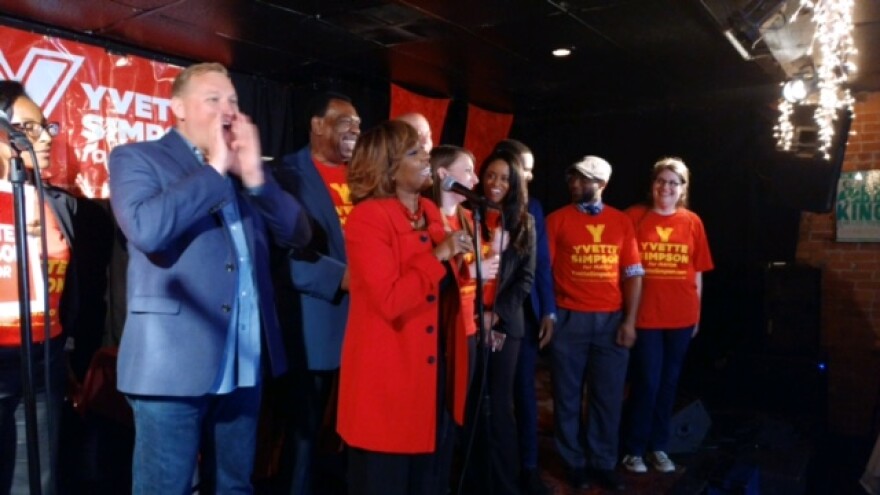It's not particularly surprising that Council Member Yvette Simpson and incumbent Mayor John Cranley came out of Tuesday's primary election as the two candidates who will battle in November.
What was a surprise to many is that Simpson ran ahead of Cranley in the polling, with the third candidate, labor lawyer Rob Richardson, running a distant third.
With all of the city's 188 precincts reporting, Simpson took 45.1 percent of the vote to 34.5 percent for Cranley, while Richardson ran third with 20.4 percent.
Simpson was outspent by Cranley by hundreds of thousands of dollars.
Simpson and Cranley, two Democrats who have been at odds with each other for years over issues such as the streetcar and public safety, will apparently carry on their debate into the fall.
Late Tuesday night, when it became apparent she was going to finish first, she struck a conciliatory tone when talking about Cranley.

"I look forward to what I hope will be a respectful, honest race to November,'' Simpson said. "And I think that's important for us to set the standard right now. Let's do this thing the right way. Let's make our case to the citizens and let's let them choose."
"My whole heart and soul is about this city,'' Simpson said. "It really is. I hope you hear me. This job is one of the most rewarding things I have ever done; and it is one of the most challenging things I have ever done; and it is one of the most life-fulfilling things I've ever done."
Cranley, who held a watch party with supporters at the Incline Public House in East Price Hill and told reporters he wanted to congratulate Simpson "on a good showing tonight and we look forward to debating in November."
"We're going to work even harder between now and November and we're going to tell everybody about what we've done - balancing the budget, putting more cops on the streets, investing in neighborhoods," Cranley said.
The turnout was miniscule - only 11 percent of the city's 217,265 voters bothered to vote in this election. It was not the smallest turnout since Cincinnati began holding mayoral primaries 16 years ago. That happened in 2013, when only 5.7 percent showed up. But it was lower even than the 15 percent who showed up for the city's first mayoral primary - which took place on one of the darkest days of American history, Sept. 11, 2001.
Cranley used his huge financial advantage to hammer at Simpson in a 30-second ad called "Priorities Matter," in which a voice-over announcer claimed Simpson "voted against putting more cops on our streets" and "pushed for another streetcar route, which would cost over $100 million."
Simpson couldn't answer directly because she didn't have enough campaign money to mount a TV ad campaign. Her responses to Cranley's charges about voting against hiring police came in the five public debates that were held during prior to the election.
But she has been an unapologetic supporter of the streetcar, which Cranley has opposed from the beginning.
"Rail is a big picture vision,'' Simpson told WVXU. "It was never a thing where we were doing to do a 3.6 mile loop and then stop."
She ran an aggressive, grassroots campaign with plenty of volunteers out of a storefront office in Walnut Hills.
After casting his vote at Knox Presbyterian Church in Hyde Park early Tuesday morning, Cranley made a round of stops at polling places around the city to shake hands with voters, stopping for lunch at Price Hill Chili, a mainstay of the campaign trail in Cincinnati.
Simpson's day began early Tuesday morning when she began traveling to numerous polling places throughout the city to greet voters. The Simpson campaign had volunteers working outside many polling places; and the campaign ran a get-out-the-vote phone bank from its Walnut Hills headquarters.

Richardson, too, made a grand tour of polling locations in every corner of the city on Tuesday.
Richardson was running for public office for the first time. The labor lawyer entered the race late, having left a nine-year term as a University of Cincinnati trustee in December.
In a gathering of supporters at a downtown nightclub, Richardson said the campaign "has been a very hard process and and very humbling process."
"I've always been fighting for people all my life, whether it was at the University of Cincinnati, so I'll figure out some path to do that and I'll have to figure out what that is."
Cranley's campaign spent at least $675,000 on TV and radio ads during the primary campaign, which is far more than Simpson and Richardson raised combined. And he still has plenty left in the bank.
There are campaign contribution limits in Cincinnati's municipal elections - $1,100 from an individual, $2,700 from a political action committee (PAC) and $10,500 from a political party.
Campaign contribution limits apply to individual election cycles, so the candidates who have donors max out during the primary can go back to them for the general election campaign and ask for another maximum contribution.
This was the first step in a two-stage process of electing Cincinnati's mayor that has been in place since 2001. The top two finishers in the mayoral primary face each other in the fall for a four-year term.
Reporters Tana Weingartner, Jay Hanselman and Bill Rinehart contributed.



